UK Family Structures, Ethnic Differences, and Divorce Rates Analysis
VerifiedAdded on 2023/01/05
|7
|2066
|24
Essay
AI Summary
This essay provides a comprehensive sociological analysis of family structures in the UK, examining various types such as nuclear, reconstituted, lone-parent, and extended families. It explores the differences in family structures across ethnic groups, considering potential reasons for these variations. The essay further compares and contrasts the functionalist and Marxist perspectives on the family, highlighting their contrasting viewpoints. It then delves into the sociological explanations for the increasing divorce rates in Britain, discussing factors such as rising expectations and secularization. Finally, the essay analyzes the impact of family breakdown on families and children, addressing emotional, behavioral, and long-term effects. The conclusion summarizes the key findings, emphasizing the interplay of societal changes and their influence on family dynamics.

Assignment
Table of Contents
Table of Contents
Paraphrase This Document
Need a fresh take? Get an instant paraphrase of this document with our AI Paraphraser
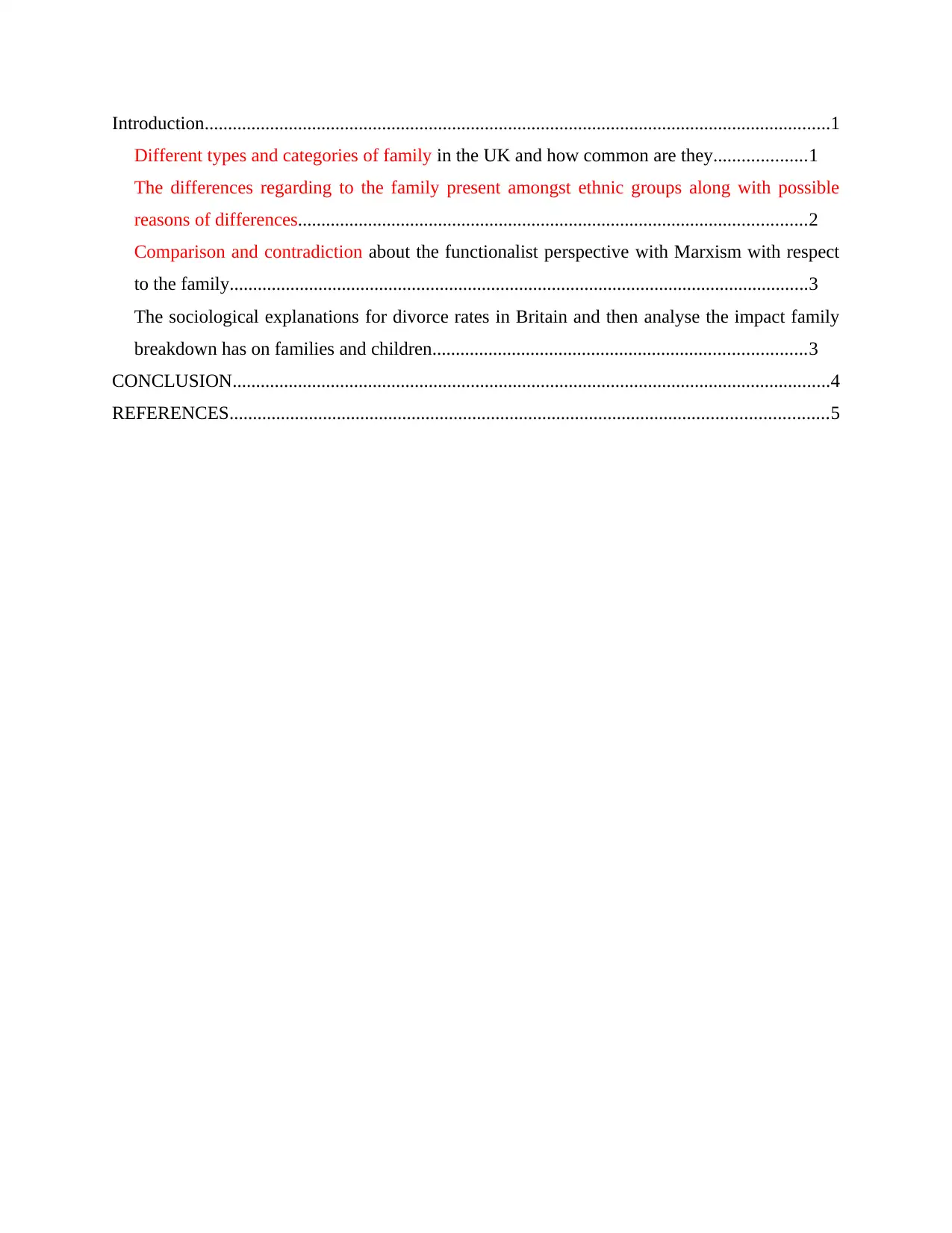
Introduction......................................................................................................................................1
Different types and categories of family in the UK and how common are they....................1
The differences regarding to the family present amongst ethnic groups along with possible
reasons of differences.............................................................................................................2
Comparison and contradiction about the functionalist perspective with Marxism with respect
to the family............................................................................................................................3
The sociological explanations for divorce rates in Britain and then analyse the impact family
breakdown has on families and children................................................................................3
CONCLUSION................................................................................................................................4
REFERENCES................................................................................................................................5
Different types and categories of family in the UK and how common are they....................1
The differences regarding to the family present amongst ethnic groups along with possible
reasons of differences.............................................................................................................2
Comparison and contradiction about the functionalist perspective with Marxism with respect
to the family............................................................................................................................3
The sociological explanations for divorce rates in Britain and then analyse the impact family
breakdown has on families and children................................................................................3
CONCLUSION................................................................................................................................4
REFERENCES................................................................................................................................5
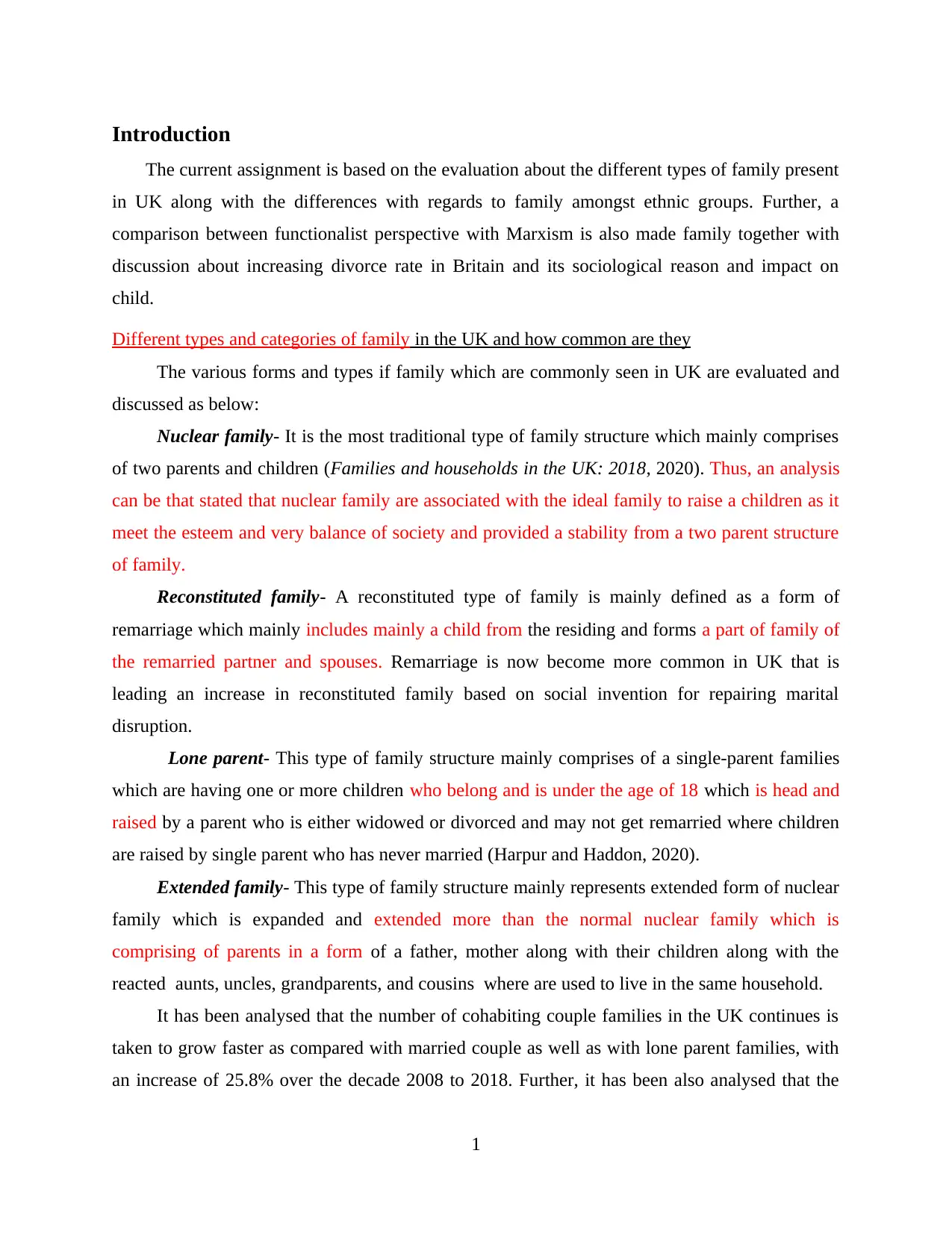
Introduction
The current assignment is based on the evaluation about the different types of family present
in UK along with the differences with regards to family amongst ethnic groups. Further, a
comparison between functionalist perspective with Marxism is also made family together with
discussion about increasing divorce rate in Britain and its sociological reason and impact on
child.
Different types and categories of family in the UK and how common are they
The various forms and types if family which are commonly seen in UK are evaluated and
discussed as below:
Nuclear family- It is the most traditional type of family structure which mainly comprises
of two parents and children (Families and households in the UK: 2018, 2020). Thus, an analysis
can be that stated that nuclear family are associated with the ideal family to raise a children as it
meet the esteem and very balance of society and provided a stability from a two parent structure
of family.
Reconstituted family- A reconstituted type of family is mainly defined as a form of
remarriage which mainly includes mainly a child from the residing and forms a part of family of
the remarried partner and spouses. Remarriage is now become more common in UK that is
leading an increase in reconstituted family based on social invention for repairing marital
disruption.
Lone parent- This type of family structure mainly comprises of a single-parent families
which are having one or more children who belong and is under the age of 18 which is head and
raised by a parent who is either widowed or divorced and may not get remarried where children
are raised by single parent who has never married (Harpur and Haddon, 2020).
Extended family- This type of family structure mainly represents extended form of nuclear
family which is expanded and extended more than the normal nuclear family which is
comprising of parents in a form of a father, mother along with their children along with the
reacted aunts, uncles, grandparents, and cousins where are used to live in the same household.
It has been analysed that the number of cohabiting couple families in the UK continues is
taken to grow faster as compared with married couple as well as with lone parent families, with
an increase of 25.8% over the decade 2008 to 2018. Further, it has been also analysed that the
1
The current assignment is based on the evaluation about the different types of family present
in UK along with the differences with regards to family amongst ethnic groups. Further, a
comparison between functionalist perspective with Marxism is also made family together with
discussion about increasing divorce rate in Britain and its sociological reason and impact on
child.
Different types and categories of family in the UK and how common are they
The various forms and types if family which are commonly seen in UK are evaluated and
discussed as below:
Nuclear family- It is the most traditional type of family structure which mainly comprises
of two parents and children (Families and households in the UK: 2018, 2020). Thus, an analysis
can be that stated that nuclear family are associated with the ideal family to raise a children as it
meet the esteem and very balance of society and provided a stability from a two parent structure
of family.
Reconstituted family- A reconstituted type of family is mainly defined as a form of
remarriage which mainly includes mainly a child from the residing and forms a part of family of
the remarried partner and spouses. Remarriage is now become more common in UK that is
leading an increase in reconstituted family based on social invention for repairing marital
disruption.
Lone parent- This type of family structure mainly comprises of a single-parent families
which are having one or more children who belong and is under the age of 18 which is head and
raised by a parent who is either widowed or divorced and may not get remarried where children
are raised by single parent who has never married (Harpur and Haddon, 2020).
Extended family- This type of family structure mainly represents extended form of nuclear
family which is expanded and extended more than the normal nuclear family which is
comprising of parents in a form of a father, mother along with their children along with the
reacted aunts, uncles, grandparents, and cousins where are used to live in the same household.
It has been analysed that the number of cohabiting couple families in the UK continues is
taken to grow faster as compared with married couple as well as with lone parent families, with
an increase of 25.8% over the decade 2008 to 2018. Further, it has been also analysed that the
1
⊘ This is a preview!⊘
Do you want full access?
Subscribe today to unlock all pages.

Trusted by 1+ million students worldwide
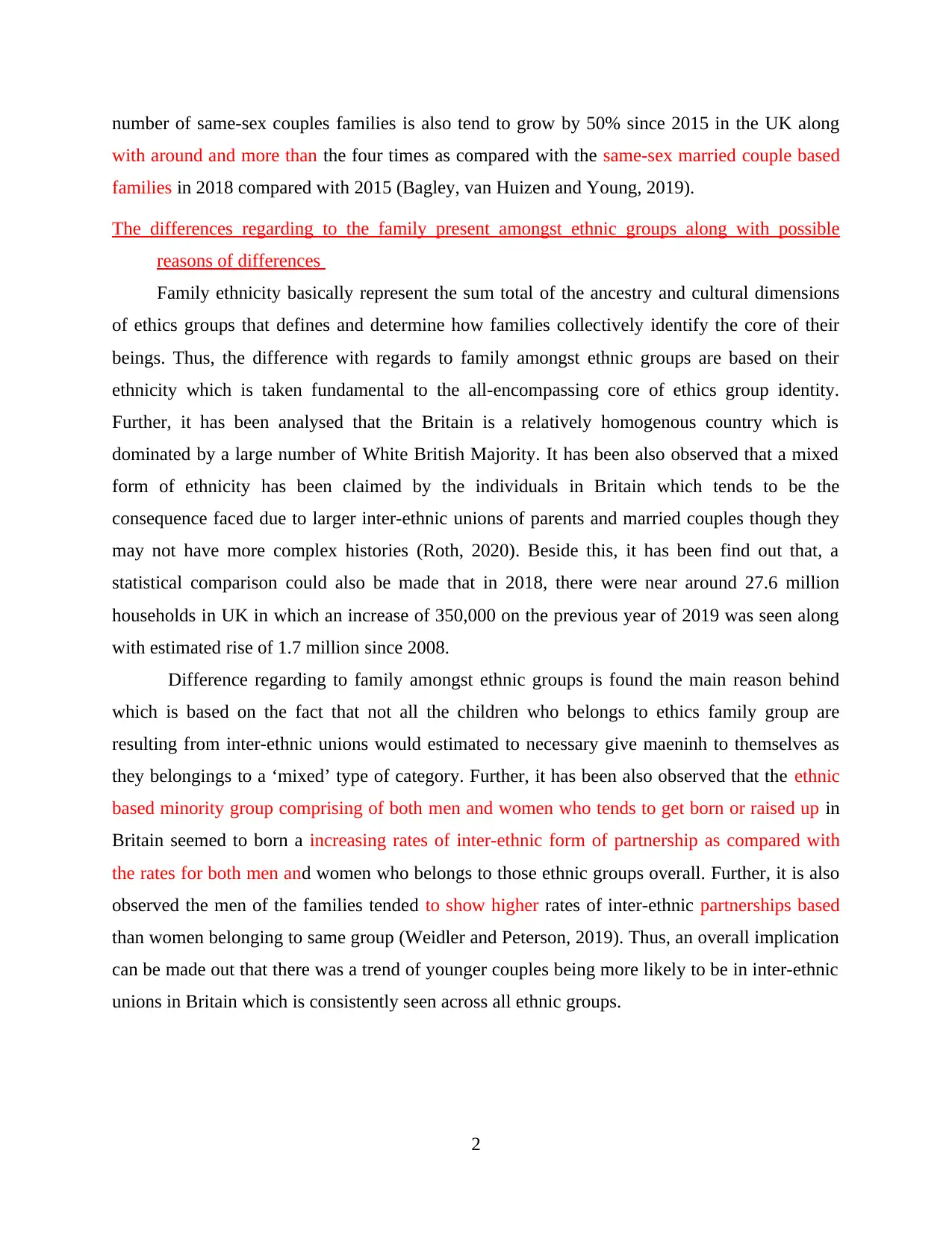
number of same-sex couples families is also tend to grow by 50% since 2015 in the UK along
with around and more than the four times as compared with the same-sex married couple based
families in 2018 compared with 2015 (Bagley, van Huizen and Young, 2019).
The differences regarding to the family present amongst ethnic groups along with possible
reasons of differences
Family ethnicity basically represent the sum total of the ancestry and cultural dimensions
of ethics groups that defines and determine how families collectively identify the core of their
beings. Thus, the difference with regards to family amongst ethnic groups are based on their
ethnicity which is taken fundamental to the all-encompassing core of ethics group identity.
Further, it has been analysed that the Britain is a relatively homogenous country which is
dominated by a large number of White British Majority. It has been also observed that a mixed
form of ethnicity has been claimed by the individuals in Britain which tends to be the
consequence faced due to larger inter-ethnic unions of parents and married couples though they
may not have more complex histories (Roth, 2020). Beside this, it has been find out that, a
statistical comparison could also be made that in 2018, there were near around 27.6 million
households in UK in which an increase of 350,000 on the previous year of 2019 was seen along
with estimated rise of 1.7 million since 2008.
Difference regarding to family amongst ethnic groups is found the main reason behind
which is based on the fact that not all the children who belongs to ethics family group are
resulting from inter-ethnic unions would estimated to necessary give maeninh to themselves as
they belongings to a ‘mixed’ type of category. Further, it has been also observed that the ethnic
based minority group comprising of both men and women who tends to get born or raised up in
Britain seemed to born a increasing rates of inter-ethnic form of partnership as compared with
the rates for both men and women who belongs to those ethnic groups overall. Further, it is also
observed the men of the families tended to show higher rates of inter-ethnic partnerships based
than women belonging to same group (Weidler and Peterson, 2019). Thus, an overall implication
can be made out that there was a trend of younger couples being more likely to be in inter-ethnic
unions in Britain which is consistently seen across all ethnic groups.
2
with around and more than the four times as compared with the same-sex married couple based
families in 2018 compared with 2015 (Bagley, van Huizen and Young, 2019).
The differences regarding to the family present amongst ethnic groups along with possible
reasons of differences
Family ethnicity basically represent the sum total of the ancestry and cultural dimensions
of ethics groups that defines and determine how families collectively identify the core of their
beings. Thus, the difference with regards to family amongst ethnic groups are based on their
ethnicity which is taken fundamental to the all-encompassing core of ethics group identity.
Further, it has been analysed that the Britain is a relatively homogenous country which is
dominated by a large number of White British Majority. It has been also observed that a mixed
form of ethnicity has been claimed by the individuals in Britain which tends to be the
consequence faced due to larger inter-ethnic unions of parents and married couples though they
may not have more complex histories (Roth, 2020). Beside this, it has been find out that, a
statistical comparison could also be made that in 2018, there were near around 27.6 million
households in UK in which an increase of 350,000 on the previous year of 2019 was seen along
with estimated rise of 1.7 million since 2008.
Difference regarding to family amongst ethnic groups is found the main reason behind
which is based on the fact that not all the children who belongs to ethics family group are
resulting from inter-ethnic unions would estimated to necessary give maeninh to themselves as
they belongings to a ‘mixed’ type of category. Further, it has been also observed that the ethnic
based minority group comprising of both men and women who tends to get born or raised up in
Britain seemed to born a increasing rates of inter-ethnic form of partnership as compared with
the rates for both men and women who belongs to those ethnic groups overall. Further, it is also
observed the men of the families tended to show higher rates of inter-ethnic partnerships based
than women belonging to same group (Weidler and Peterson, 2019). Thus, an overall implication
can be made out that there was a trend of younger couples being more likely to be in inter-ethnic
unions in Britain which is consistently seen across all ethnic groups.
2
Paraphrase This Document
Need a fresh take? Get an instant paraphrase of this document with our AI Paraphraser
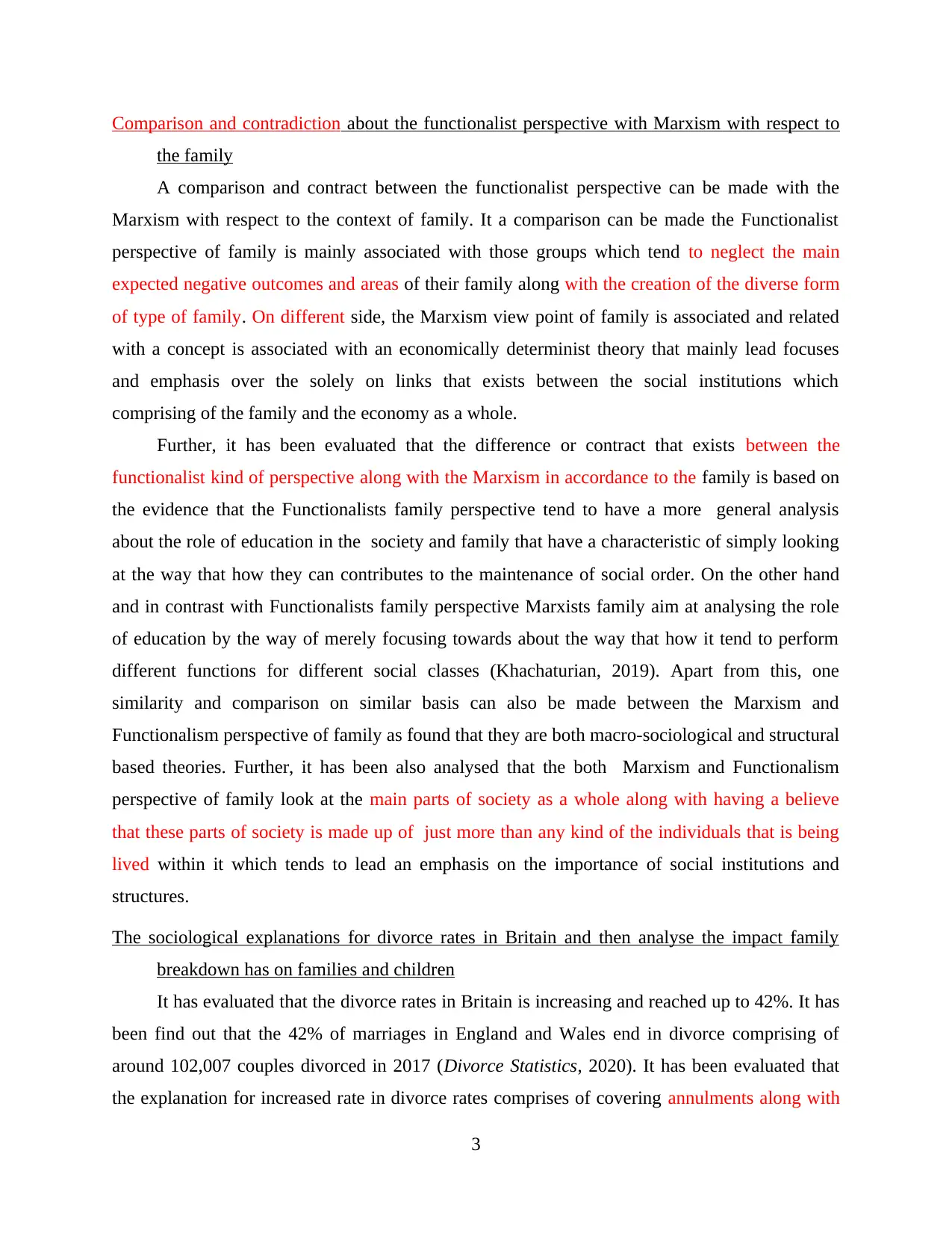
Comparison and contradiction about the functionalist perspective with Marxism with respect to
the family
A comparison and contract between the functionalist perspective can be made with the
Marxism with respect to the context of family. It a comparison can be made the Functionalist
perspective of family is mainly associated with those groups which tend to neglect the main
expected negative outcomes and areas of their family along with the creation of the diverse form
of type of family. On different side, the Marxism view point of family is associated and related
with a concept is associated with an economically determinist theory that mainly lead focuses
and emphasis over the solely on links that exists between the social institutions which
comprising of the family and the economy as a whole.
Further, it has been evaluated that the difference or contract that exists between the
functionalist kind of perspective along with the Marxism in accordance to the family is based on
the evidence that the Functionalists family perspective tend to have a more general analysis
about the role of education in the society and family that have a characteristic of simply looking
at the way that how they can contributes to the maintenance of social order. On the other hand
and in contrast with Functionalists family perspective Marxists family aim at analysing the role
of education by the way of merely focusing towards about the way that how it tend to perform
different functions for different social classes (Khachaturian, 2019). Apart from this, one
similarity and comparison on similar basis can also be made between the Marxism and
Functionalism perspective of family as found that they are both macro-sociological and structural
based theories. Further, it has been also analysed that the both Marxism and Functionalism
perspective of family look at the main parts of society as a whole along with having a believe
that these parts of society is made up of just more than any kind of the individuals that is being
lived within it which tends to lead an emphasis on the importance of social institutions and
structures.
The sociological explanations for divorce rates in Britain and then analyse the impact family
breakdown has on families and children
It has evaluated that the divorce rates in Britain is increasing and reached up to 42%. It has
been find out that the 42% of marriages in England and Wales end in divorce comprising of
around 102,007 couples divorced in 2017 (Divorce Statistics, 2020). It has been evaluated that
the explanation for increased rate in divorce rates comprises of covering annulments along with
3
the family
A comparison and contract between the functionalist perspective can be made with the
Marxism with respect to the context of family. It a comparison can be made the Functionalist
perspective of family is mainly associated with those groups which tend to neglect the main
expected negative outcomes and areas of their family along with the creation of the diverse form
of type of family. On different side, the Marxism view point of family is associated and related
with a concept is associated with an economically determinist theory that mainly lead focuses
and emphasis over the solely on links that exists between the social institutions which
comprising of the family and the economy as a whole.
Further, it has been evaluated that the difference or contract that exists between the
functionalist kind of perspective along with the Marxism in accordance to the family is based on
the evidence that the Functionalists family perspective tend to have a more general analysis
about the role of education in the society and family that have a characteristic of simply looking
at the way that how they can contributes to the maintenance of social order. On the other hand
and in contrast with Functionalists family perspective Marxists family aim at analysing the role
of education by the way of merely focusing towards about the way that how it tend to perform
different functions for different social classes (Khachaturian, 2019). Apart from this, one
similarity and comparison on similar basis can also be made between the Marxism and
Functionalism perspective of family as found that they are both macro-sociological and structural
based theories. Further, it has been also analysed that the both Marxism and Functionalism
perspective of family look at the main parts of society as a whole along with having a believe
that these parts of society is made up of just more than any kind of the individuals that is being
lived within it which tends to lead an emphasis on the importance of social institutions and
structures.
The sociological explanations for divorce rates in Britain and then analyse the impact family
breakdown has on families and children
It has evaluated that the divorce rates in Britain is increasing and reached up to 42%. It has
been find out that the 42% of marriages in England and Wales end in divorce comprising of
around 102,007 couples divorced in 2017 (Divorce Statistics, 2020). It has been evaluated that
the explanation for increased rate in divorce rates comprises of covering annulments along with
3
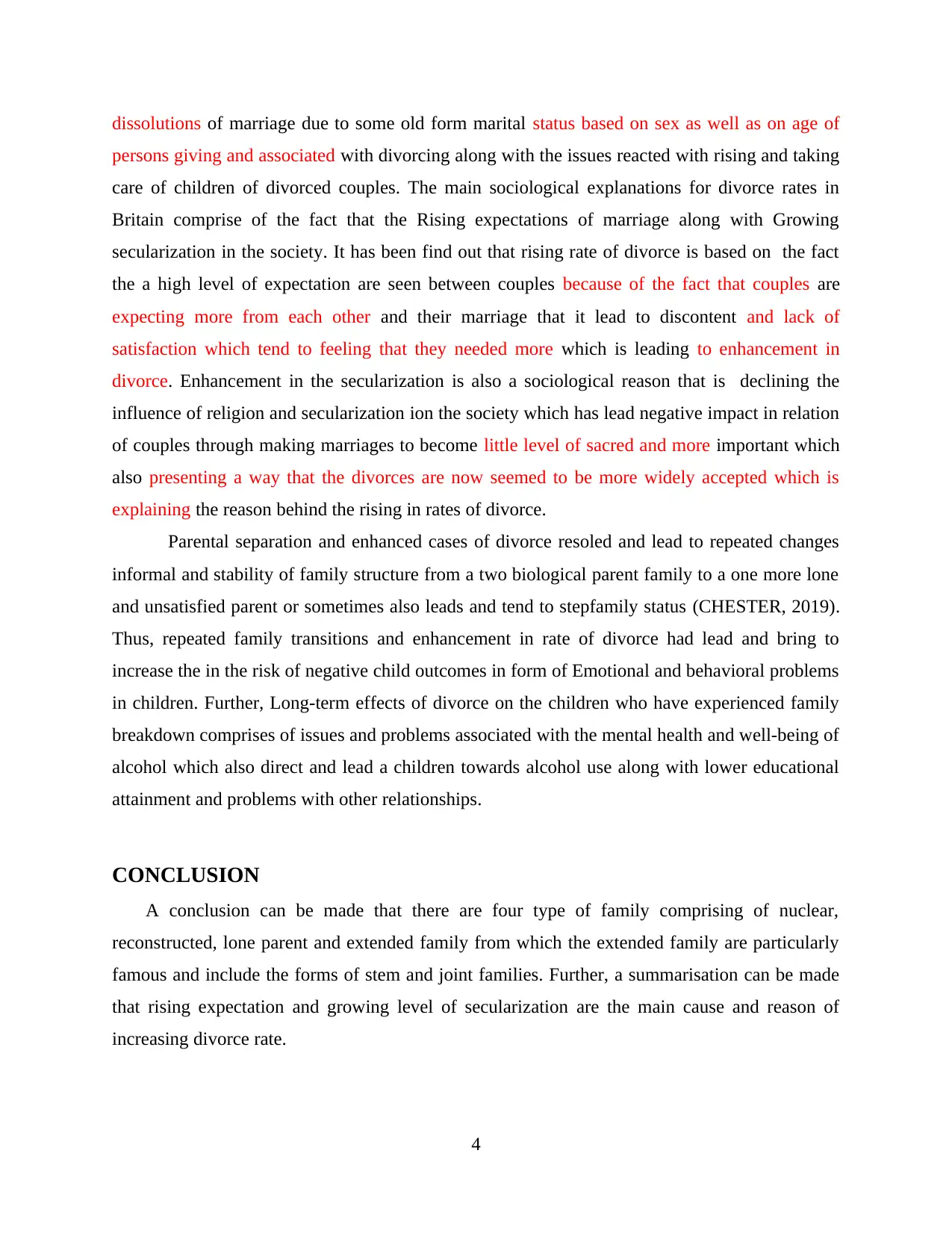
dissolutions of marriage due to some old form marital status based on sex as well as on age of
persons giving and associated with divorcing along with the issues reacted with rising and taking
care of children of divorced couples. The main sociological explanations for divorce rates in
Britain comprise of the fact that the Rising expectations of marriage along with Growing
secularization in the society. It has been find out that rising rate of divorce is based on the fact
the a high level of expectation are seen between couples because of the fact that couples are
expecting more from each other and their marriage that it lead to discontent and lack of
satisfaction which tend to feeling that they needed more which is leading to enhancement in
divorce. Enhancement in the secularization is also a sociological reason that is declining the
influence of religion and secularization ion the society which has lead negative impact in relation
of couples through making marriages to become little level of sacred and more important which
also presenting a way that the divorces are now seemed to be more widely accepted which is
explaining the reason behind the rising in rates of divorce.
Parental separation and enhanced cases of divorce resoled and lead to repeated changes
informal and stability of family structure from a two biological parent family to a one more lone
and unsatisfied parent or sometimes also leads and tend to stepfamily status (CHESTER, 2019).
Thus, repeated family transitions and enhancement in rate of divorce had lead and bring to
increase the in the risk of negative child outcomes in form of Emotional and behavioral problems
in children. Further, Long-term effects of divorce on the children who have experienced family
breakdown comprises of issues and problems associated with the mental health and well-being of
alcohol which also direct and lead a children towards alcohol use along with lower educational
attainment and problems with other relationships.
CONCLUSION
A conclusion can be made that there are four type of family comprising of nuclear,
reconstructed, lone parent and extended family from which the extended family are particularly
famous and include the forms of stem and joint families. Further, a summarisation can be made
that rising expectation and growing level of secularization are the main cause and reason of
increasing divorce rate.
4
persons giving and associated with divorcing along with the issues reacted with rising and taking
care of children of divorced couples. The main sociological explanations for divorce rates in
Britain comprise of the fact that the Rising expectations of marriage along with Growing
secularization in the society. It has been find out that rising rate of divorce is based on the fact
the a high level of expectation are seen between couples because of the fact that couples are
expecting more from each other and their marriage that it lead to discontent and lack of
satisfaction which tend to feeling that they needed more which is leading to enhancement in
divorce. Enhancement in the secularization is also a sociological reason that is declining the
influence of religion and secularization ion the society which has lead negative impact in relation
of couples through making marriages to become little level of sacred and more important which
also presenting a way that the divorces are now seemed to be more widely accepted which is
explaining the reason behind the rising in rates of divorce.
Parental separation and enhanced cases of divorce resoled and lead to repeated changes
informal and stability of family structure from a two biological parent family to a one more lone
and unsatisfied parent or sometimes also leads and tend to stepfamily status (CHESTER, 2019).
Thus, repeated family transitions and enhancement in rate of divorce had lead and bring to
increase the in the risk of negative child outcomes in form of Emotional and behavioral problems
in children. Further, Long-term effects of divorce on the children who have experienced family
breakdown comprises of issues and problems associated with the mental health and well-being of
alcohol which also direct and lead a children towards alcohol use along with lower educational
attainment and problems with other relationships.
CONCLUSION
A conclusion can be made that there are four type of family comprising of nuclear,
reconstructed, lone parent and extended family from which the extended family are particularly
famous and include the forms of stem and joint families. Further, a summarisation can be made
that rising expectation and growing level of secularization are the main cause and reason of
increasing divorce rate.
4
⊘ This is a preview!⊘
Do you want full access?
Subscribe today to unlock all pages.

Trusted by 1+ million students worldwide
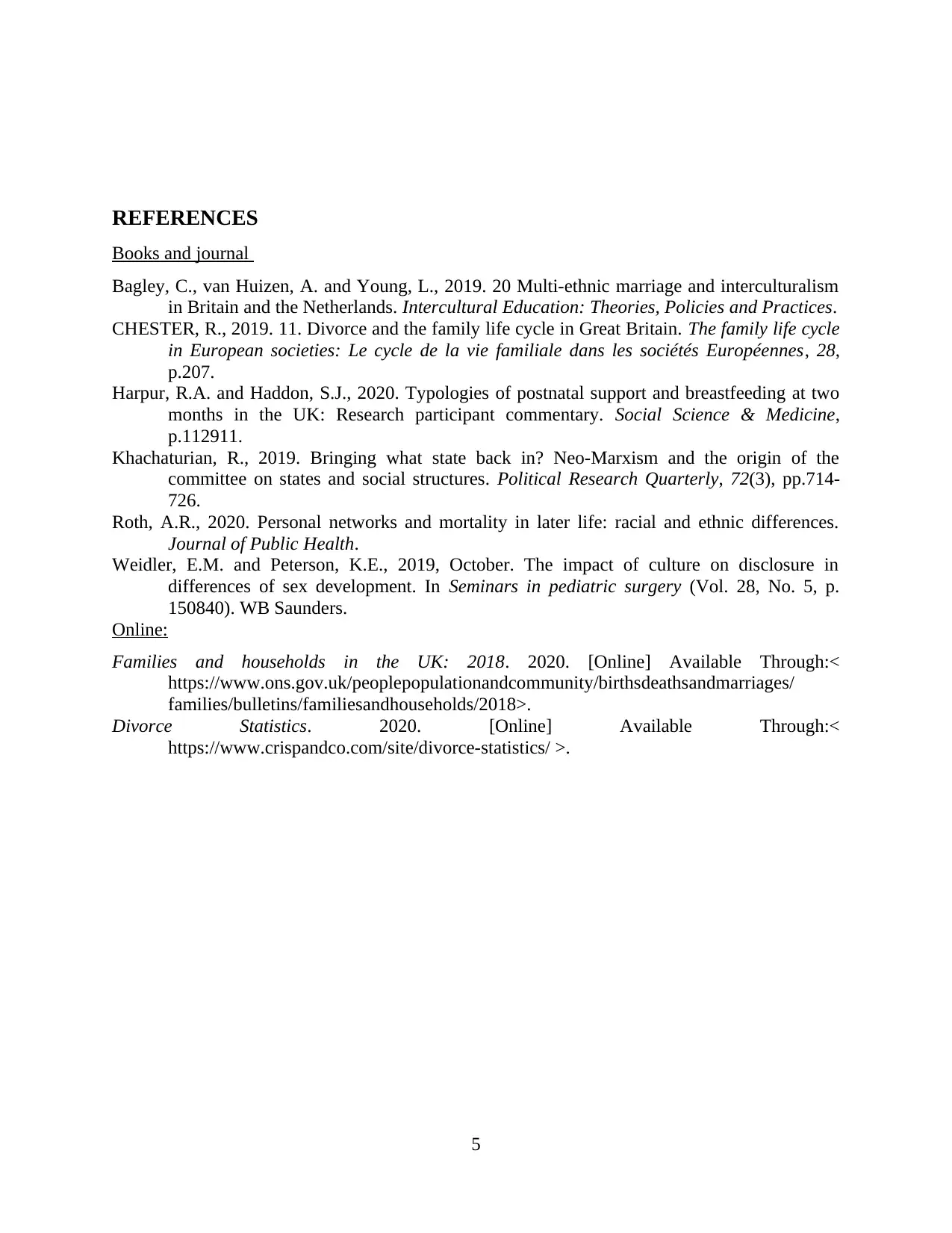
REFERENCES
Books and journal
Bagley, C., van Huizen, A. and Young, L., 2019. 20 Multi-ethnic marriage and interculturalism
in Britain and the Netherlands. Intercultural Education: Theories, Policies and Practices.
CHESTER, R., 2019. 11. Divorce and the family life cycle in Great Britain. The family life cycle
in European societies: Le cycle de la vie familiale dans les sociétés Européennes, 28,
p.207.
Harpur, R.A. and Haddon, S.J., 2020. Typologies of postnatal support and breastfeeding at two
months in the UK: Research participant commentary. Social Science & Medicine,
p.112911.
Khachaturian, R., 2019. Bringing what state back in? Neo-Marxism and the origin of the
committee on states and social structures. Political Research Quarterly, 72(3), pp.714-
726.
Roth, A.R., 2020. Personal networks and mortality in later life: racial and ethnic differences.
Journal of Public Health.
Weidler, E.M. and Peterson, K.E., 2019, October. The impact of culture on disclosure in
differences of sex development. In Seminars in pediatric surgery (Vol. 28, No. 5, p.
150840). WB Saunders.
Online:
Families and households in the UK: 2018. 2020. [Online] Available Through:<
https://www.ons.gov.uk/peoplepopulationandcommunity/birthsdeathsandmarriages/
families/bulletins/familiesandhouseholds/2018>.
Divorce Statistics. 2020. [Online] Available Through:<
https://www.crispandco.com/site/divorce-statistics/ >.
5
Books and journal
Bagley, C., van Huizen, A. and Young, L., 2019. 20 Multi-ethnic marriage and interculturalism
in Britain and the Netherlands. Intercultural Education: Theories, Policies and Practices.
CHESTER, R., 2019. 11. Divorce and the family life cycle in Great Britain. The family life cycle
in European societies: Le cycle de la vie familiale dans les sociétés Européennes, 28,
p.207.
Harpur, R.A. and Haddon, S.J., 2020. Typologies of postnatal support and breastfeeding at two
months in the UK: Research participant commentary. Social Science & Medicine,
p.112911.
Khachaturian, R., 2019. Bringing what state back in? Neo-Marxism and the origin of the
committee on states and social structures. Political Research Quarterly, 72(3), pp.714-
726.
Roth, A.R., 2020. Personal networks and mortality in later life: racial and ethnic differences.
Journal of Public Health.
Weidler, E.M. and Peterson, K.E., 2019, October. The impact of culture on disclosure in
differences of sex development. In Seminars in pediatric surgery (Vol. 28, No. 5, p.
150840). WB Saunders.
Online:
Families and households in the UK: 2018. 2020. [Online] Available Through:<
https://www.ons.gov.uk/peoplepopulationandcommunity/birthsdeathsandmarriages/
families/bulletins/familiesandhouseholds/2018>.
Divorce Statistics. 2020. [Online] Available Through:<
https://www.crispandco.com/site/divorce-statistics/ >.
5
1 out of 7
Related Documents
Your All-in-One AI-Powered Toolkit for Academic Success.
+13062052269
info@desklib.com
Available 24*7 on WhatsApp / Email
![[object Object]](/_next/static/media/star-bottom.7253800d.svg)
Unlock your academic potential
Copyright © 2020–2026 A2Z Services. All Rights Reserved. Developed and managed by ZUCOL.





